- Home
- Alice Walker
Color Purple Collection Page 9
Color Purple Collection Read online
Page 9
Your sister, Nettie
THE NEXT LETTER AFTER THAT ONE SAY,
Dear Celie,
While we were in town Corrine bought cloth to make me two sets of traveling outfits. One olive green and the other gray. Long gored skirts and suit jackets to be worn with white cotton blouses and lace-up boots. She also bought me a woman’s boater with a checkered band.
Although I work for Corrine and Samuel and look after the children, I don’t feel like a maid. I guess this is because they teach me, and I teach the children and there’s no beginning or end to teaching and learning and working—it all runs together.
Saying good-bye to our church group was hard. But happy, too. Everyone has such high hopes for what can be done in Africa. Over the pulpit there is a saying: Ethiopia Shall Stretch Forth Her Hands to God. Think what it means that Ethiopia is Africa! All the Ethiopians in the bible were colored. It had never occurred to me, though when you read the bible it is perfectly plain if you pay attention only to the words. It is the pictures in the bible that fool you. The pictures that illustrate the words. All of the people are white and so you just think all the people from the bible were white too. But really white white people lived somewhere else during those times. That’s why the bible says that Jesus Christ had hair like lamb’s wool. Lamb’s wool is not straight, Celie. It isn’t even curly.
What can I tell you about New York—or even about the train that took us there! We had to ride in the sit-down section of the train, but Celie, there are beds on trains! And a restaurant! And toilets! The beds come down out of the walls, over the tops of the seats, and are called berths. Only white people can ride in the beds and use the restaurant. And they have different toilets from colored.
One white man on the platform in South Carolina asked us where we were going—we had got off the train to get some fresh air and to dust the grit and dust out of our clothes. When we said Africa he looked offended and tickled too. Niggers going to Africa, he said to his wife. Now I have seen everything.
When we got to New York we were tired and dirty. But so excited! Listen, Celie, New York is a beautiful city. And colored own a whole section of it, called Harlem. There are colored people in more fancy motor cars than I thought existed, and living in houses that are finer than any white person’s house down home. There are more than a hundred churches! And we went to every one of them. And I stood before each congregation with Samuel and Corrine and the children and sometimes our mouths just dropped open from the generosity and goodness of those Harlem people’s hearts. They live in such beauty and dignity, Celie. And they give and give and then reach down and give some more, when the name "Africa" is mentioned.
They love Africa. They defend it at the drop of a hat. And speaking of hats, if we had passed our hats alone they would not have been enough to hold all the donations to our enterprise. Even the children dredged up their pennies. Please give these to the children of Africa, they said. They were all dressed so beautifully, too, Celie. I wish you could have seen them. There is a fashion in Harlem now for boys to wear something called knickers—sort of baggy pants, fitted tight just below the knee, and for girls to wear garlands of flowers in their hair. They must be the most beautiful children alive, and Adam and Olivia couldn’t take their eyes off them.
Then there were the dinners we were invited to, the breakfasts, lunches, and suppers. I gained five pounds just from tasting. I was too excited to really eat.
And all the people have indoor toilets, Celie. And gas or electric lights!
Well, we had two weeks of study in the Olinka dialect, which the people in this region speak. Then we were examined by a doctor (colored!) and given medical supplies for ourselves and for our host village by the Missionary Society of New York. It is run by white people and they didn’t say anything about caring about Africa, but only about duty. There is already a white woman missionary not far from our village who has lived in Africa for the past twenty years. She is said to be much loved by the natives even though she thinks they are an entirely different species from what she calls Europeans. Europeans are white people who live in a place called Europe. That is where the white people down home came from. She says an African daisy and an English daisy are both flowers, but totally different kinds. The man at the Society says she is successful because she doesn’t “coddle” her charges. She also speaks their language. He is a white man who looks at us as if we cannot possibly be as good with the Africans as this woman is.
My spirits sort of drooped after being at the Society. On every wall there was a picture of a white man. Somebody called Speke, somebody called Livingstone. Somebody called Daly. Or was it Stanley? I looked for a picture of the white woman but didn’t see one. Samuel looked a little sad too, but then he perked up and reminded us that there is one big advantage we have. We are not white. We are not Europeans. We are black like the Africans themselves. And that we and the Africans will be working for a common goal: the uplift of black people everywhere.
Your sister, Nettie
DEAR CELIE,
Samuel is a big man. He dresses in black almost all the time, except for his white clerical collar. And he is black. Until you see his eyes you think he’s somber, even mean, but he has the most thoughtful and gentle brown eyes. When he says something it settles you, because he never says anything off the top of his head and he’s never out to dampen your spirit or to hurt. Corrine is a lucky woman to have him as her husband.
But let me tell you about the ship! The ship, called The Malaga, was three stories high! And we had rooms (called cabins) with beds. Oh, Celie, to lie in a bed in the middle of the ocean! And the ocean! Celie, more water than you can imagine in one place. It took us two weeks to cross it! And then we were in England, which is a country full of white people and some of them very nice and with their own Anti-Slavery & Missionary Society. The churches in England were also very eager to help us and white men and women, who looked just like the ones at home, invited us to their gatherings and into their homes for tea, and to talk about our work. “Tea” to the English is really a picnic indoors. Plenty of sandwiches and cookies and of course hot tea. We all used the same cups and plates.
Everyone said I seemed very young to be a missionary, but Samuel said that I was very willing, and that, anyway, my primary duties would be helping with the children and teaching a kindergarten class or two.
Our work began to seem somewhat clearer in England because the English have been sending missionaries to Africa and India and China and God knows where all, for over a hundred years. And the things they have brought back! We spent a morning in one of their museums and it was packed with jewels, furniture, fur carpets, swords, clothing, even tombs from all the countries they have been. From Africa they have thousands of vases, jars, masks, bowls, baskets, statues—and they are all so beautiful it is hard to imagine that the people who made them don’t still exist. And yet the English assure us they do not. Although Africans once had a better civilization than the European (though of course even the English do not say this: I get this from reading a man named J. A. Rogers) for several centuries they have fallen on hard times. “Hard times” is a phrase the English love to use, when speaking of Africa. And it is easy to forget that Africa’s “hard times” were made harder by them. Millions and millions of Africans were captured and sold into slavery—you and me, Celie! And whole cities were destroyed by slave catching wars. Today the people of Africa—having murdered or sold into slavery their strongest folks—are riddled by disease and sunk in spiritual and physical confusion. They believe in the devil and worship the dead. Nor can they read or write.
Why did they sell us? How could they have done it? And why do we still love them? These were the thoughts I had as we tramped through the chilly streets of London. I studied England on a map, so neat and serene, and I became hopeful in spite of myself that much good for Africa is possible, given hard work and the right frame of mind. And then we sailed for Africa. Leaving Southampton, England on the 24th of Jul
y and arriving in Monrovia, Liberia on the 12th of September. On the way we stopped in Lisbon, Portugal and Dakar, Senegal.
Monrovia was the last place we were among people we were somewhat used to, since it is an African country that was “founded” by ex-slaves from America who came back to Africa to live. Had any of their parents or grandparents been sold from Monrovia, I wondered, and what was their feeling, once sold as slaves, now coming back, with close ties to the country that bought them, to rule.
Celie, I must stop now. The sun is not so hot now and I must prepare for the afternoon classes and vesper service.
I wish you were with me, or I with you.
My love,
Your sister, Nettie
DEAREST CELIE,
It was the funniest thing to stop over in Monrovia after my first glimpse of Africa, which was Senegal. The capital of Senegal is Dakar and the people speak their own language, Senegalese I guess they would call it, and French. They are the blackest people I have ever seen, Celie. They are black like the people we are talking about when we say, “So and so is blacker than black, he’s blueblack.” They are so black, Celie, they shine. Which is something else folks down home like to say about real black folks. But Celie, try to imagine a city full of these shining, blueblack people wearing brilliant blue robes with designs like fancy quilt patterns. Tall, thin, with long necks and straight backs. Can you picture it at all, Celie? Because I felt like I was seeing black for the first time. And Celie, there is something magical about it. Because the black is so black the eye is simply dazzled, and then there is the shining that seems to come, really, from moonlight, it is so luminous, but their skin glows even in the sun.
But I did not really like the Senegalese I met in the market. They were concerned only with their sale of produce. If we did not buy, they looked through us as quickly as they looked through the white French people who live there. Somehow I had not expected to see any white people in Africa, but they are here in droves. And not all are missionaries.
There are bunches of them in Monrovia, too. And the president, whose last name is Tubman, has some in his cabinet. He also has a lot of white-looking colored men in his cabinet. On our second evening in Monrovia we had tea at the presidential palace. It looks very much like the American white house (where our president lives) Samuel says. The president talked a good bit about his efforts trying to develop the country and about his problems with the natives, who don’t want to work to help build the country up. It was the first time I’d heard a black man use that word. I knew that to white people all colored people are natives. But he cleared his throat and said he only meant “native” to Liberia. I did not see any of these “natives” in his cabinet. And none of the cabinet members’ wives could pass for natives. Compared to them in their silks and pearls, Corrine and I were barely dressed, let alone dressed for the occasion. But I think the women we saw at the palace spend a lot of their time dressing. Still, they look dissatisfied. Not like the cheery schoolteachers we saw only by chance, as they herded their classes down to the beach for a swim.
Before we left we visited one of the large cacoa plantations they have. Nothing but cacoa trees as far as the eye can see. And whole villages built right in the middle of the fields. We watched the weary families come home from work, still carrying their cacoa seed buckets in their hands (these double as lunch buckets next day), and sometimes— if they are women—their children on their backs. As tired as they are, they sing! Celie. Just like we do at home. Why do tired people sing? I asked Corrine. Too tired to do anything else, she said. Besides, they don’t own the cacoa fields, Celie, even president Tubman doesn’t own them. People in a place called Holland do. The people who make Dutch chocolate. And there are overseers who make sure the people work hard, who live in stone houses in the corners of the fields.
Again I must go. Everyone is in bed and I am writing by lamplight. But the light is attracting so many bugs I am being eaten alive. I have bites everywhere, including my scalp and the bottoms of my feet.
But—
Did I mention my first sight of the African coast? Something struck in me, in my soul, Celie, like a large bell, and I just vibrated. Corrine and Samuel felt the same. And we kneeled down right on deck and gave thanks to God for letting us see the land for which our mothers and fathers cried—and lived and died—to see again.
Oh, Celie! Will I ever be able to tell you all?
I dare not ask, I know. But leave it all to God.
Your everloving sister, Nettie
DEAR GOD,
What with being shock, crying and blowing my nose, and trying to puzzle out words us don’t know, it took a long time to read just the first two or three letters. By the time us got up to where she good and settled in Africa, Mr. _____ and Grady come home.
Can you handle it? ast Shug.
How I’m gon keep from killing him, I say.
Don’t kill, she say. Nettie be coming home before long. Don’t make her have to look at you like us look at Sofia.
But it so hard, I say, while Shug empty her suitcase and put the letters inside.
Hard to be Christ too, say Shug. But he manage. Remember that. Thou Shalt Not Kill, He said. And probably wanted to add on to that, Starting with me. He knowed the fools he was dealing with.
But Mr. _____ not Christ. I’m not Christ, I say.
You somebody to Nettie, she say. And she be pissed if you change on her while she on her way home.
Us hear Grady and Mr. _____ in the kitchen. Dishes rattling, safe door open and shut.
Naw, I think I feel better if I kill him, I say. I feels sickish. Numb, now.
Naw you won’t. Nobody feel better for killing nothing. They feel something is all.
That better than nothing.
Celie, she say, Nettie not the only one you got to worry bout.
Say what, I ast.
Me, Celie, think about me a little bit. Miss Celie, if you kill Albert, Grady be all I got left. I can’t even stand the thought of that.
I laugh, thinking bout Grady’s big toofs.
Make Albert let me sleep with you from now on, while you here, I say.
And somehow or other, she do.
DEAR GOD,
Us sleep like sisters, me and Shug. Much as I still want to be with her, much as I love to look, my titties stay soft, my little button never rise. Now I know I’m dead. But she say, Naw, just being mad, grief, wanting to kill somebody will make you feel this way. Nothing to worry about. Titties gonna perk up, button gonna rise again.
I loves to hug up, period, she say. Snuggle. Don’t need nothing else right now.
Yeah, I say. Hugging is good. Snuggle. All of it’s good.
She say, Times like this, lulls, us ought to do something different.
Like what? I ast.
Well, she say, looking me up and down, let’s make you some pants.
What I need pants for? I say. I ain’t no man.
Don’t git uppity, she say. But you don’t have a dress do nothing for you. You not made like no dress pattern, neither.
I don’t know, I say. Mr. _____ not going to let his wife wear pants.
Why not? say Shug. You do all the work around here. It’s a scandless, the way you look out there plowing in a dress. How you keep from falling over it or getting the plow caught in it is beyond me.
Yeah? I say.
Yeah. And another thing, I used to put on Albert’s pants when we was courting. And he one time put on my dress.
No he didn’t.
Yes he did. He use to be a lot of fun. Not like now. But he loved to see me in pants. It was like a red flag to a bull.
Ugh, I say. I could just picture it, and I didn’t like it one bit.
Well, you know how they is, say Shug.
What us gon make ’em out of, I say.
We have to git our hands on somebody’s army uniform, say Shug. For practice. That good strong material and free.
Jack, I say. Odessa’s husband.
Okay, she say. And everyday we going to read Nettie’s letters and sew.
A needle and not a razor in my hand, I think.
She don’t say nothing else, just come over to me and hug.
DEAR GOD,
Now I know Nettie alive I begin to strut a little bit.
Think, When she come home us leave here. Her and me and our two children. What they look like, I wonder. But it hard to think bout them. I feels shame. More than love, to tell the truth. Anyway, is they all right here? Got good sense and all? Shug say children got by incest turn into dunces. Incest part of the devil’s plan.
But I think bout Nettie.
It’s hot, here, Celie, she write. Hotter than July. Hotter than August and July. Hot like cooking dinner on a big stove in a little kitchen in August and July. Hot.
Dear Celie,
We were met at the ship by an African from the village we are settling in. His Christian name is Joseph. He is short and fat, with hands that seem not to have any bones in them. When he shook my hand it felt like something soft and damp was falling and I almost caught it. He speaks a little English, what they call pidgin English. It is very different from the way we speak English, but somehow familiar. He helped us unload our things from the ship into the boats that came out to get us. These boats are really dugout canoes, like the Indians had, the ones you see in pictures. With all our belongings we filled three of them, and a fourth one carried our medical and teaching supplies.
Once in the boat we were entertained by the songs of our boatmen as they tried to outpaddle each other to the shore. They paid very little attention to us or our cargo. When we reached the shore they didn’t bother to help us alight from the boat and actually set some of our supplies right down in the water. As soon as they had browbeat poor Samuel out of a tip that Joseph said was too big, they were off hallooing another group of people who were waiting at the edge of the water to be taken to the ship.

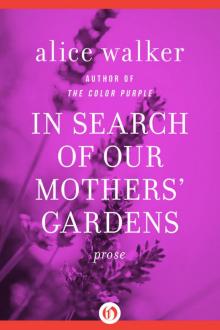 In Search of Our Mothers' Gardens: Prose
In Search of Our Mothers' Gardens: Prose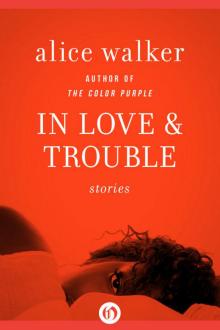 In Love and Trouble: Stories of Black Women: Stories of Black Women
In Love and Trouble: Stories of Black Women: Stories of Black Women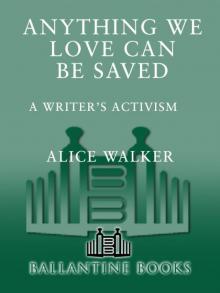 Anything We Love Can Be Saved
Anything We Love Can Be Saved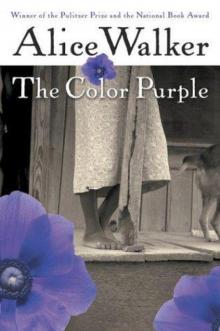 The Color Purple
The Color Purple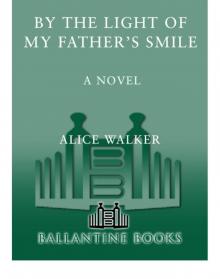 By the Light of My Father's Smile
By the Light of My Father's Smile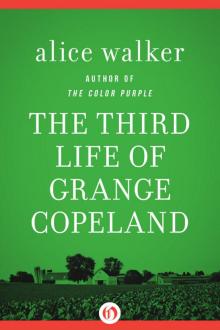 The Third Life of Grange Copeland
The Third Life of Grange Copeland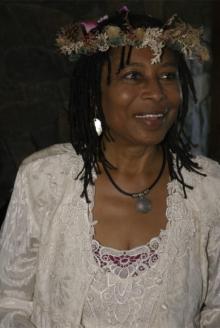 You Can't Keep a Good Woman Down
You Can't Keep a Good Woman Down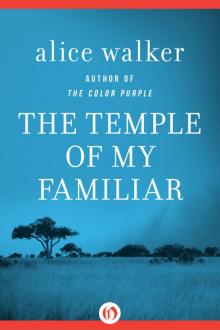 The Temple of My Familiar
The Temple of My Familiar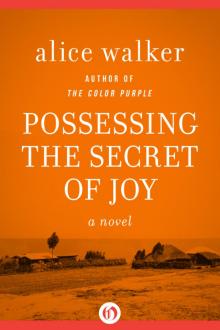 Possessing the Secret of Joy
Possessing the Secret of Joy We Are the Ones We Have Been Waiting For
We Are the Ones We Have Been Waiting For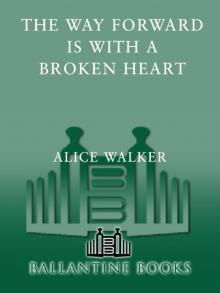 The Way Forward Is With a Broken Heart
The Way Forward Is With a Broken Heart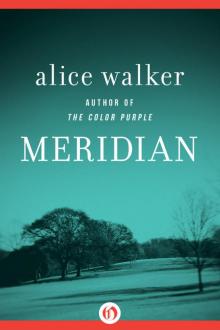 Meridian
Meridian Revolutionary Petunias
Revolutionary Petunias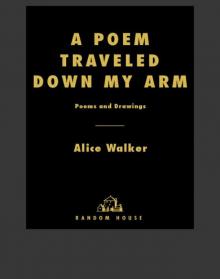 A Poem Traveled Down My Arm
A Poem Traveled Down My Arm Once
Once Horses Make a Landscape Look More Beautiful
Horses Make a Landscape Look More Beautiful Living by the Word
Living by the Word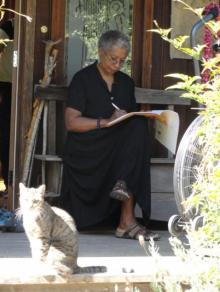 In Love and Trouble
In Love and Trouble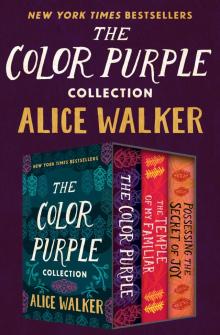 The Color Purple Collection
The Color Purple Collection Now Is the Time to Open Your Heart
Now Is the Time to Open Your Heart Color Purple Collection
Color Purple Collection Taking the Arrow Out of the Heart
Taking the Arrow Out of the Heart The World Will Follow Joy
The World Will Follow Joy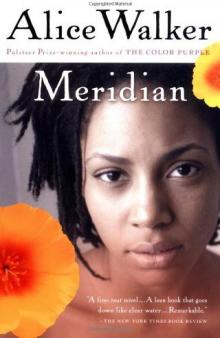 Meridian (1976)
Meridian (1976) Absolute Trust in the Goodness of the Earth
Absolute Trust in the Goodness of the Earth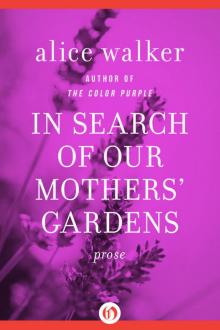 In Search of Our Mothers' Gardens
In Search of Our Mothers' Gardens